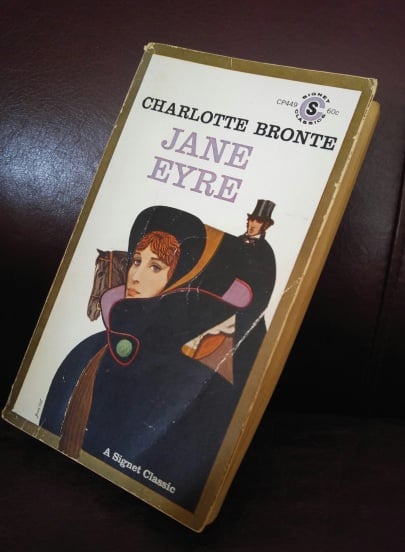Why I love Jane Eyre, pt. 1

I didn't expect Jane Eyre to be my favorite book.
I had the same "favorite book" for about 20 years. A Prayer for Owen Meany, by John Irving. I read it in college, and I didn't just like it. It didn't just inspire me. It left me changed -- burrowed under my skin and penetrated every corner of my being. It became something I carried with me.
Meanwhile, I avoided books like authors like the Brontës and other long-dead white people. I've talked about this prejudice, and how Jane Austen helped me over it. Even still, I didn't think any book could supplant my estimation for Owen Meany. (Yes, I NOW recognize that Irving is a upper-middle class white man who deserved my esteem far less than a Victorian white woman, but isn't youth all about misguided arrogance?)
Enter Jane Eyre. If haven't read this book (or haven't read it in a very long time) here's the gist:
Jane is a poor, plain-looking orphan who is abused by various people and institutions for the better part of her youth until she lands a job in the home of a grumpy man, about 20 years her senior. They fall in love. But his mysterious past (& unrealistic expectations) present an insurmountable obstacle to their relationship.
It's got all the trappings of a good romantic drama: beautiful language, well-drawn characters, suspense, and tension. Like all my favorite romantic movies, it's both swoony and complicated. The first time I read it, I honestly wasn't sure how it would end.
But the more I read it (and I've finished it 3 or 4 times now), I grow more and more impressed. Charlotte Brontë was ahead of her time. The book (although annoyingly moralistic, at times) is overtly critical of religious institutions, classicism, and sexism. It's also a surprisingly spot-on representation of post-traumatic attitudes and behaviors.
This last bit is what I find most intriguing. Subtleties in Brontë's portrayals of Jane, Rochester, and other characters speak to a deep understanding of trauma and its impact. Only, such vocabulary didn't really exist in Brontë's world, which suggests her depictions come from experience, understanding, empathy, and/or intuition. (I find myself asking, what happened to Charlotte Brontë? What did she see? What did she draw from?) Her writing also suggests that the trauma-response patterns we observe, study, and treat today aren't new; they aren't a product of "oversensitivity" or an invention of "wokeness." They are our nervous systems responding to painful, life-changing situations. Of course, those of us who have experienced trauma and/or understand trauma-informed practices know this. But there's something validating about seeing such accurate representations drawn so long ago.
That's why I think Jane Eyre is timeless and necessary, and why I'm currently outlining a series of blog posts that will dive deeper into a trauma-informed analysis of the book. If I was motivated enough to get a Ph.D., this might be the kind of thing I'd do for a dissertation. Or maybe I'm more motivated because I'm going to do it for fun.
Either way, keep an eye out. I don't have a full schedule yet. And I wouldn't promise to stick to it if I did. But these ideas feel too important to let go.